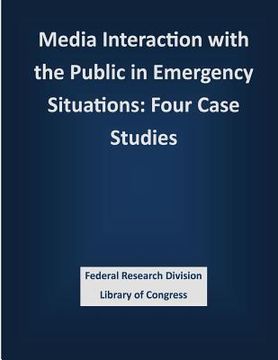Media Interaction with the Public in Emergency Situations: Four Case Studies (en Inglés)
Reseña del libro "Media Interaction with the Public in Emergency Situations: Four Case Studies (en Inglés)"
Emergency situations arise from a wide variety of natural and man-made events ranging from earthquakes and hurricanes to domestic disturbances and terrorist strikes to nuclear power accidents and airplane crashes. Information about these events can be disseminated by several means, but one of the most important channels for communicating information about emergency situations is the modern mass media. Despite reservations that may be expressed about their ability to play the role of communicator impartially, the media transmit considerable information about the circumstances and hazards of emergencies to a wide audience.In attempting to understand how the media function, it may be useful to describe journalists' work in terms of three types of "games."1 These "games" help conceptualize the ways in which the media generally handle the information they pass forward to the public. The first game may be termed the "gatekeeper game" in which a newsroom, as an organization, sets the rules and packages "the news" for its readers. Journalists decide what information is to be passed on from sources of knowledge to a mass audience, what should be changed, and what information should and should not be passed through media channels.A second activity could be called the "objectivity game." Here, a newsroom crew simply follows its own interests in pursuit of news, which journalists may perceive as the equivalent of serving the public interest. In so doing, however, journalists generally insist upon defining what they do in their own terms, not those of "the public's interest."A third perspective is what may be termed "the reporting game." Journalists do not "make" the news or have a specific agenda, they would argue, they simply "report" it. Their reports mirror reality. This is the view reflected in CBS anchorman Walter Cronkite's quip at the conclusion of his newscasts: "And that's the way it is."In emergency situations, the media may function in a number of ways. They "originate" or"create" news through their own independent reporting. They also serve as a conduit for emergency information from official sources and, in addition, function as a filter or independent check on emergency-related news issued by official emergency personnel.2 Should private citizens wish for an alternative to the media, they can turn to government agencies and social networks for information and help.

